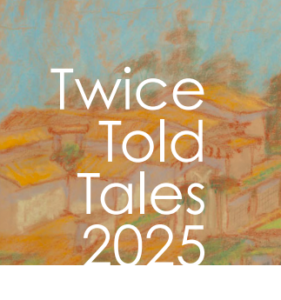The Area of Concentration requirement is as follows: Majors will complete an individually articulated area of concentration consisting of a minimum of 20 units of upper-division coursework. The plan for the area of concentration (the application to declare the major) must be approved during the student’s sophomore or junior year by an American Studies faculty advisor.
The concentration requirement assures that students have reasonable depth and breadth in their American Studies major. The concentrations must include coursework from three or more departments or fields, and must examine a theme, issue, or problem in American culture. Areas of concentration may be highly individualized, depending on the student’s personal interest, prior preparation, and the availability of courses.
In the drop-down menu there are examples of how areas of concentration could be formulated for specific American Studies majors.
To see examples of how previous American Studies majors have designed their concentrations (including which classes they took), view our Graduate Profiles.
“American Folklore and Folklife” allows the student interested in the study of folklore and folklife to examine and analyze traditional expressive culture (e.g., ethnic, regional, occupational, gender, and other traditional identities) in all its forms. Examining the historical, cultural, social, and psychological dimensions of such expressive forms as myth, legend, folktale, music, dance, art, belief, foodways, ritual and ceremony, the student investigates how tradition expresses the dynamics of human behavior.
Courses:
Anthropology 121AC – American Material Culture
Anthropology 163AC – American Folklore
Native American Studies 120 – Topics in Native American Arts
Nutritional Science 104 – Human Food Practices
Religious Studies 171AC – Religious Pluralism in America
Theater, Dance and Performance Studies 121 – Performance and Culture
Alternate Courses:
American Studies 110 – When topic is Folklore and American Culture
Anthropology 122A/B/F/G – Archaeology of the Americas
Anthropology 136B – Museum Methods
Anthropology 160AC – Forms of Folklore
Anthropology 162AC – The Folktale in the Modern World: The Marvelous and the Monstrous
English 133T – When topic is Orality and Black Literature
English 166AC – When topic is Race and Revision in Early America
Linguistics 151 – Language and Gender
Native American Studies 149 – Gender in Native American Society
Psychology 106 – Psychology of Dreams
Rhetoric 132 – Rhetoric, Culture and Society
Sociology C112/Religious Studies C182 – Sociology of Religion
The American Foodways Concentration examines both historic and contemporary social, economic, cultural, and psychological factors that shape food consumption practices. Exploring food systems from production through consumption, students in this Concentration will trace agricultural concerns, examine environmental, ethical, and economic factors in food production and distribution, and investigate the various beliefs, rituals, and behaviors surrounding food in the United States.
Courses:
- Anthropology 140 – The Anthropology of Food
- Environmental Economics and Policy 141 – Agricultural and Environmental Policy
- Environmental Economics and Policy 153 – Population, Environment, and Development
- ESPM C159 – Human Diet
- Geography 130 – Food and the Environment
- History 103D – Foodways: An Edible History of Modern Capitalism
- Nutritional Science 104 – Food, Culture, and the Environment
- Nutritional Science 135 – Food Systems Organization and Management
- Nutritional Science 108A – Introduction and Application of Food Science
- Nutritional Science 166 – Nutrition in the Community
- Public Health 101 – A Sustainable World: Challenges and Opportunities
- Sociology 190 – Food, Health, and Inequality
This area of concentration examines the creation, production, reception, and consumption of popular/commercial culture in the U.S.
Courses:
- African American Studies 142B – The Cross Cultural Images of American Minorities in Film
- American Studies C118 – Topics in Popular Culture
- English 176 – Literature and Popular Culture
- Gender and Womens Studies 125 – Women and Film
- Native American Studies 158 – Native Americans and the Cinema
- Sociology 160 – Sociology of Culture
Alternate Courses:
- African American Studies 142AC – Race and American Film
- American Studies 101 – When topic is The 1980s
- American Studies 101 – When topic is The Atomic Age
- American Studies 110 – When topic is Advertising in America
- American Studies 110 – When topic is The American Teenager
- American Studies C125 – American Media and Global Politics
- English 150 When topic is – Novel to Film Adaptation
- Film 108 – Film Genre
- History 124b – The Recent United States
- Media Studies 102 – The Effects of Mass Media
- Sociology 180 – American Society
American Public Policy investigates the way that social problems are defined and analyzed in the United States, and focuses on the political and historical dimensions of public policy.
Courses:
- African American Studies 107 – Race and Public Policy
- Legal Studies 162 – Courts and Social Policy
- Political Science 183 – Administrative Behavior
- Public Policy 101 – Introduction to Public Policy Analysis
- Public Health 150D – Introduction to Health Policy and Management
- Public Policy 170 – Ethics in Public Policy
Alternate Courses:
- Asian American Studies – 145 Politics, Public Policy, and Asian American Communities
- Legal Studies C165 – Drug, Tobacco, and Alcohol Policy
- Political Science 189 – Topics in Public Organization and Policy
- Public Policy 103 – Wealth and Poverty
- Public Policy 117AC – Race, Ethnicity, and Public Policy
- Public Policy 184 – The Economics of Public Problem-Solving
- Social Welfare 112 – Social Welfare Policy
Looking at buildings, artworks, objects of all kinds for social content and cultural meaning, this concentration draws on the resources of many departments. Focusing on physical objects designed and made by artisans, artists, professional designers, vernacular builders, housewives and others, students concentrate on analyzing the historical, rhetorical, and cultural as well as functional aspects of the human-made material world. Taking foundational/lower division courses as required in several of the listed disciplines, students will design their major drawing on these and other (approved) offerings.
Courses:
- Anthropology 121A/AC – American Material Culture
- Architecture 174C – San Francisco Architecture
- Art History 185A – American Art (1800-present)
- Art History C189 – The American Forest: Its Ecology, History, and Representation
- Geography 125 – The American City
- Landscape Architecture 170 – History and Literature of Landscape Architecture
Alternate Courses:
- American Studies C111A – Architecture in Depression and War
- American Studies 110 – When topic is Advertising in America
- Anthropology 122A – Archaeology of North America
- Anthropology 148 – Anthropology of the Environment
- Architecture 118 – Housing American Cultures
- Art History 185B – American Architecture: Domestic Forms
- City Planning 111 – Introduction to Housing
- City Planning 140 – Urban Design: City-Building and Place-Making
- Environmental Design C169A – American Cultural Landscapes, 1600 to 1900
- Environmental Design C169B – American Cultural Landscapes, 1900 to Present
- Geography 181 – Urban Field Study
- History 120AC – American Environmental and Cultural History
- Landscape Architecture 141AC – American Landscape: Multicultural Difference & Diversity
- Landscape Architecture C171 – The American Designed Landscape since 1850
Disability Studies directs its focus toward how society creates disability by constructing identities and barriers.
Courses:
- Anthropology 115 – Introduction to Medical Anthropology
- English 175 – Literature and Disability
- Public Health 130AC – Aging, Health, and Diversity
- Sociology 155 – Sociology of Illness and Medicine
- UGIS 110 – Introduction to Disability Studies
- UGIS 112 – Women and Disability
Alternate Courses:
- Anthropology 119 – Special Topics in Medical Anthropology
- Chicano Studies 176 – Chicanos and Health Care
- City and Regional Planning 120 – Community Planning and Public Policy for Disability
- Economics 157 – Health Economics
- Landscape Architecture 140 – Social and Psychological Factors in Open Space Design
- UGIS 116 – Disability, Identity, and Social Movements
This area of concentration explores the history, policy implications, and practices of education in the United States.
Courses:
- American Studies 110 – When topic is Schooling in America
- Asian American Studies 146 – Asian Americans and Education
- Chicano Studies 172 – Chicanos and the Educational System
- Education 140AC – Literacy: Individual and Societal Development
- Education 189 – Democracy and Education
- Sociology 113 – Sociology of Education
Alternate Courses:
- Education 185 – Gender and Education in the Americas
- Education 190 – Current Issues in Education
- Education 190B – Unraveling Education: A Participatory Inquiry
This area of concentration explores American attitudes about healthcare and the development of institutions for healthcare. N.B. For entry into some of these courses, the student may need to take preparatory lower-division coursework.
Courses:
- Anthropology 115 – Introduction to Medical Anthropology
- Chicano Studies 176 – Chicanos and Health Care
- Economics 157 – Health Economics
- Public Health 113 – Campus/Community Health Impact Program
- Public Health 131AC – Race, Ethnicity, and Health in America
- Sociology 155 – Sociology of Illness and Medicine
Alternate Courses:
- Anthropology 114 – History of Anthropological Thought
- Nutritional Science 166 – Nutrition in the Community
- Public Health 103 – Drugs, Healthy, and Society
- Sociology 110 – Organizations and Institutions
- Sociology 150 – Social Psychology
This area of concentration explores the nature, meaning, organization, and function of labor in the United States. Exploring the socialization and representation of workers, alongside employment relations and organized labor, students can investigate labor as market, labor as process, and labor as people.
Courses:
- Gender and Women Studies 139 – Women and Work
- Education 162A – Teachers’ Work
- Sociology 116 – Sociology of Work
- African American Studies 116 – Slavery and African American Life Before 1865
- History 100 – History of American Capitalism: Business, Work, Economy
- L&S C150T – Working People in the Global Economy
Alternate Courses:
- Social Welfare 110 – Social Work as a Profession
- Anthropology 172AC – Ethnographic Perspectives on American Capitalism
- Film and Media 108 – Use this course when the topic is Mad Men
- Economics 152 – Wage Theory & Policy (Prerequisites: Econ 100 or 101A)
- Economics 151 – Labor Economics (Prerequisites: Econ 100 or 101A or consent)
- Public Policy C103 – Wealth and Poverty
Nature in America explores the historical, social, ideological, scientific, economic, and geographic dimensions of the natural environment in the United States. The student choosing this area of concentration studies the interaction of natural systems and social contexts over time.
Courses:
- Anthropology 148 – Anthropology of the Environment
- Art History C189 – The American Forest: Its Ecology, History, and Representation
- Art History 185A – American Art (1800-present)
- English 130B – American Literature: 1800-1865
- ESPM 161 – Environmental Philosophy and Ethic
- History 120AC – American Environmental and Cultural History
Alternate Courses:
- Anthropology 129D – The Archaeology of Global Change
- Environmental Economics and Policy C102 – Natural Resource Economics
- Environmental Economics and Policy 131 – Globalization and the Natural Environment
- Environmental Economics and Policy 162 – Economics of Water Resources
- Environmental Economics and Policy C180 – Ecological Economics in Historical Context
- ESPM 102C – Resource Management
- ESPM 102D – Resource and Environmental Policy
- ESPM 116B – Range Ecology, Improvements, and Management
- ESPM 117 – Urban Garden Ecosystems
- ESPM 160AC – American Environmental and Cultural History
- Geography 134 – Natural Hazards and Problems
- History 126B – The American West
- History 127AC – California
- Landscape Architecture 110 – Ecological Analysis
- American Class Structures
- American People and Places
- American Warfare
- Childhood in America
- Housing, Community and Economic Development in the U.S.
- Identity and Representation in the U.S.
- Individual Learning and Education Psychology
- U.S. Social Movements
This area of concentration examines the interplay between social groups and power, inequality and social justice in the United States.
Courses:
- African American Studies 121 – Black Political Life in the United States
- Anthropology 139 – Controlling Processes
- Peace and Conflict Studies 128AC – Human Rights and American Cultures
- Philosophy 113AC – Philosophical Perspectives on Race and Culture
- Political Science 111AC – The Politics of Displacement
- Political Science 138F – Immigrants, Citizenship, and the State
Alternate Courses:
- African American Studies 124 – Political Philosophy of Martin Luther King, Jr.
- African American Studies 125 – History of the Civil Rights Movement
- African American Studies 138 – Black Nationalism
- Asian American Studies 125 – Contemporary Issues of Southeast Asian Refugees in the U.S.
- Asian American Studies 126 – Southeast Asian Migration & Community Formation
- Asian American Studies 141 – Law in the Asian American Community
- Chicano Studies 110 – Latina/o Philosophy and Religious Thought
- Legal Studies 160 – Punishment, Culture, and Society
- Native American Studies 100 – Native American Law
- Native American Studies 101 – Native American Tribal Governments
- Peace and Conflict Studies 154AC – Multicultural Conflict Resolution
- Political Science 176 – The Unseen America
- UGIS 116 – Disability, Identity, and Social Movements
Focusing on the history of encounters between the various peoples who comprise the American nation, this area of concentration exploresthe migrations, settlements, contacts, contests, and exchanges that have shaped the cultural, political, social, and economic construction of the United States.
Courses:
- African American Studies 116 – Slavery and American Life Before 1865
- Anthropology 122B – Culture Contact in North America
- Demography 145AC – The American Immigrant Experience
- Geography 159AC – The Southern Border
- Linguistics 155AC – Native American Meets the Europeans
- Political Science 118AC – Three American Cultures
Alternate Courses:
- African American Studies 109 – Black and Male in American Life
- African American Studies 111 – Race, Class, and Gender in the United States
- African American Studies 117 – African Americans in the Industrial Age, 1865-1970
- Anthropology 124AC – Hawaiian Ethnohistory
- Asian American Studies 121 – Chinese American History
- Asian American Studies 122 – Japanese American History
- Asian American Studies 123 – Korean American History
- Asian American Studies 124 – Filipino American History
- Chicano Studies 150A – History of the Southwest: Spanish and Mexican Period
- Chicano Studies 150B – History of the Southwest: Mexican-United States War to Present
- Chicano Studies 159 – Mexican Immigration
- Ethnic Studies 135AC – Contemporary U.S. Immigration
- Ethnic Studies 136 – Immigrant Women
- Ethnic Studies 147 – Women of Color in the United States
- Ethnic Studies 150AC – People of Mixed Racial Descent
- History 122AC – Antebellum America: The Advent of Mass Society
- History 123 – Civil War and Reconstruction
- History 126B – The West in United States History
- History 125 – History of African Americans and Race Relations in the United States
- History 137AC – The Repeopling of America
- Native American Studies 175 – History of Native Americans in California
- Rhetoric 152AC – Race and Order in the New Republic
The STEM, Communication, and Society Concentration assumes interest in the cultural meaning of computer design and the social construction of American engineering education: an investigation of the ways in which computer design is formed and changed in a social context. Students in this concentration may examine the social and ethical implications of computer technology; trace the development, application, and consequences of information technology as social and technical processes; and study how messages about science and technology are products of both individual effort and collective enterprise. N.B. For advanced technical courses (*), the student would need rigorous preparation in mathematics, physics, and computer science. For instance, a student might be an undergraduate engineering student who transferred to American Studies in the junior year. In some cases, non-engineering students might negotiate permission to take such courses (*) on a P/NP basis.
Courses:
- African American Studies 134 – Information Technology and Society
- Computer Science 152* – Computer Architecture and Engineering
- Computer Science 160* – User Interface Design and Development
- Computer Science C182* – Designing, Visualizing, and Understanding Deep Neural Networks
- Computer Science 195 – Social Implications of Computer Science
- Computer Science 194 – EECS for All: Social Justice in EECS
- Data Science 104 – Human Contexts and Ethics of Data
- Engineering 185 – The Art of STEM Communication
- History 103D – The History of the Computer in Society
- History 182A – Science, Technology, and Society
- Interdisciplinary Studies 100D – Introduction to Technology, Society, and Culture
- Sociology 166 – Society and Technology
Courses:
City and Regional Planning 110 Introduction to City Planning City and Regional Planning 118AC The Urban Community Geography 125 The American City Geography 181 Urban Field Study History 134A/B The Age of the City Sociology 125AC Urban Sociology
Alternate Courses:
African American Studies 137 Multicultural Communities American Studies 102 When topic is New Orleans American Studies 102 When topic is San Francisco and Los Angeles Architecture 170A/B An Historical Survey of Architecture & Urbanism Architecture 174AC San Francisco Architecture City and Regional Planning 113B Community Economic Development Environmental Design 100 The City: Theories & Methods in Urban Studies Environmental Design 169A/B American Cultural Landscapes
This area of concentration focuses on the history, changing structure and meaning of the family in American society.
Courses:
African American Studies 122
African American Families in American Society
Chicano Studies 179
Chicana/o Families
History C129
Children Through History: Social Practices and Social Welfare
Legal Studies 155
Government and the Family
Public Policy C164
Impact of Government Policies on Poor Children and Families
Sociology 111
Sociology of the Family
Alternate Courses:
Asian American Studies 150
Gender and Generation in Asian American Families
Demography C126
Social Consequences of Population Dynamics
Demography C165
Family and Household in Comparative Perspective
Gender and Women’s Studies 120
The History of American Women
History 131
Social History of the United States
Psychology 131
Developmental Psychopathology
This area of concentration explores the role of the United States outside of its national borders, focusing on both U.S. foreign policy and the flow of American peoples, ideas, and goods throughout the world.
Courses:
- Asian American Studies 130 – Asian Americans and Foreign Policy
- Environmental Economics and Policy 131 – Globalization and the Natural Environment
- History 128 – Liberal Superpower: Reform and Political Economy in Postwar U.S. History
- Peace and Conflict Studies 149 – Global Change and World Order
- Political Science 126A – International Political Economy
- Political Science 138G – National Success and Failure in the Age of a Global Economy
Alternate Courses:
- Business Administration 178 – Introduction to International Business
- Chicano Studies 165 – Cuba, the United States and Cuban Americans
- Ethnic Studies C173 – Cultures of U.S. Imperialism: Spanish-American War of 1898
- Military Officers Education Program 145 – National Security Forces in Contemporary American Society
- Peace and Conflict Studies 119 – Topics in Peace and Conflict Issues
- Peace and Conflict Studies 127 – Human Rights and Global Politics
- Political Science 124A – War!
- Political Science 127A – International Law
- PEIS 150 – Advanced Study in Political Economy of Industrial Society
This area of concentration explores American consumer culture in relation to literature and performance.
Courses:
- African American Studies 144 – Black Visual Culture
- American Studies C174 – Visual Autobiography
- English C136 – When topic is Consumer Culture in Post-Civil War America
- Rhetoric 139AC – Autobiography and American Individualism
- Theater 119 – Performance Theory: Asian/American Performance Across Media
- Theater 121 – Performance and Culture – Performance and Television
Alternate Courses:
- African American Studies 150B – African American Literature 1920 to Present
- African American Studies C151A – African American Plays from 1858 to 1959
- African American Studies C151B – Contemporary African American Drama
- Asian American Studies 171 – Asian Americans in Film and Video
- Asian American Studies 172 – Asian American Literature
- Gender and Womens Studies C153B – Contemporary Images of African American Women in Literature
- Music 130A/B/BM – African American Music
- Music 174F – Studies in African American Music
- Native American Studies 152 – Native American Literature
- Native American Studies 158 – Native Americans and the Cinema
- Native American Studies 182 – Native American Music
- Theater C132 – African American Dramatic Literature




